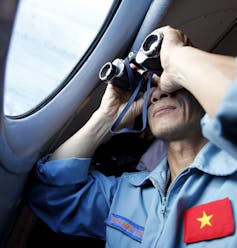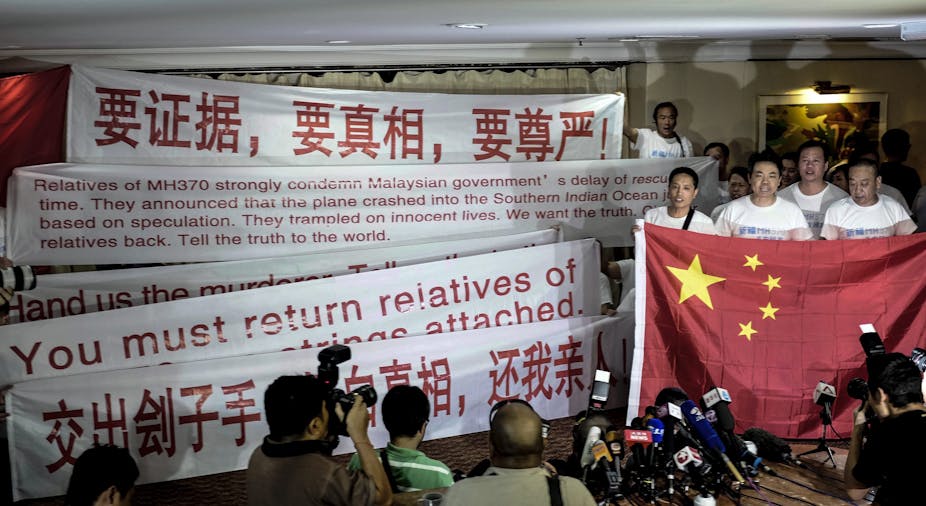When Malaysian Airlines flight 370 failed to arrive, authorities at first concluded it had crashed in a relatively shallow part of the Gulf of Thailand. As the days passed more countries dispatched ships and aircraft to the area. At one point 25 countries were contributing to efforts to locate the missing plane and perhaps even find survivors.
The tragedy of MH370 had at least some benefit. The supposed crash site was not far from the hotly contested Spratly Island chain yet Vietnam, Philippines and China all joined the multinational effort along with the US, Singapore, Thailand, Australia and many others. Asia’s simmering strategic rivalries seemed to be put aside for a basic humanitarian concern.
Territorial faultlines revealed
Appearances of collaboration, however, are deceiving. Far from providing a common endeavour on which to build some much-needed trust, the search for the missing plane exposed just how unsettled the regional environment has become.
The long search and its frustrations, especially the wasted fortnight effort in the South China Sea, has rebounded badly on bilateral relations in the region. That China, via official news agency Xinhua, would criticise America for failing to pass on information is not entirely surprising. That relations with Malaysia would suffer was more unexpected.
Malaysia’s handling of information and public relations has been poor and widely criticised. But China has itself been less than deft in denouncing Kuala Lumpur’s “dereliction of duty”. While relations between the two are rectifiable, that China publicly castigated one of its better friends in southeast Asia showed a lack of diplomatic sophistication in handling a complex emergency.
Other bilateral relationships have also been strained. As events unfolded it appears that Thai officials had determined that the jet abruptly headed west and crossed the Malay peninsula but they did not pass this on to Malaysia.
Some have even argued that Japan’s lack of participation early in the search has further worsened Sino-Japanese relations.

Among the most disconcerting facets of this saga was the way in which parties to the South China Sea dispute prioritised their long-running territorial claims ahead of search and rescue efforts. China chose not to deploy vessels in the vicinity of the supposed crash site; it kept craft in place to maintain pressure on the Philippines and dispatched large ships from over 1000 nautical miles away to join in the search.
Both the Philippines’ and Vietnam’s commitments to territorial disputes hampered aspects of their contributions to the search.
Although these decisions were ultimately immaterial to the search outcome given the fate of the plane, they illustrate that even in the case of human disaster Asia’s territorial disputes remain the political priority.
Perhaps most worryingly, some feel that the problems around information flows and flight tracking will provide China with a pretext to establish a South China Sea version of its East China Sea Air Defence Identification Zone (ADIZ), announced last December to international consternation. If it does so, tensions will be further ratcheted up.
Failings expose empty rhetoric
Since the mid-1970s, southeast Asian states have been talking about co-ordination and collaboration in search and rescue as well as humanitarian and disaster relief. The rhetoric on such commitments has grown substantially in recent years. Yet beyond carefully planned exercises, the ability of ASEAN members and their interlocutors to cooperate during crises has been poor.
The tragedy of MH370 ought to have been a spur to put aside intra-mural differences, as was the case during the SARS crisis of 2002-03. Instead, it has shown poor levels of functional co-operation, anaemic mechanisms and low levels of trust.
The ASEAN Emergency Rapid Assessment Team was not used. ASEAN itself was missing in action and no meaningful multilateral co-ordination was visible. When various countries released information it was in a patchy and frankly mistrustful manner.
MH370 has publicly exposed regional mechanisms as ineffectual and reinforced the pervasive sense of uncertainty that grips the region. If states cannot put aside their differences for something like this, there is very little chance that they are going to be able to take much harder steps to reduce tensions.
In this human tragedy was the potential to build trust among Asian states. In failing to seize this opportunity not only did the search take much longer than it should have, Asia’s states underlined just how febrile regional security settings are becoming.

